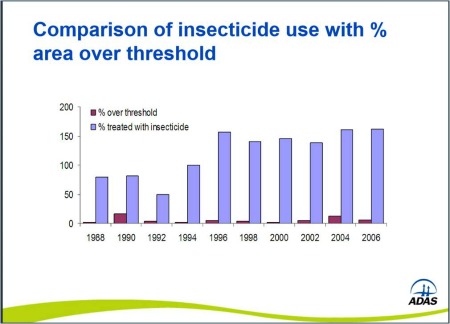5 Reasons Farmers Must Have Independent Information About 'Crop Pest' Threat
I'm all for supporting farmers as they endeavour to both grow crops, and at the same time, take care of the countryside. As such, I am convinced they need access to independent information so that they can make the right decisions, especially when it comes to 'pest threat.
And here are my 5 reasons why:
1. Research shows farmers may treat even when the threat of pests doesn't justify it
According to independent research by ADAS, whose clients include DEFRA, it appears that many farmers are using pesticides unnecessarily.
Their study indicated that in a comparison of insecticide use with percentage area having an infestation level over the threshold warranting treatment (from 1988 to 2006) of pollen beetle on oil seed rape, the application of pesticide was not warranted in the vast majority of instances (1).
Below is a graph taken from the study.

2. Treating fields with pesticides is expensive for farmers
Given the research from ADAS above, this cannot be good for the environment, and must surely be expensive for farmers.
The National Institute of Agricultural Botany state:
“Pesticides are a considerable cost for farmers. Approximately 35% of the variable cost for combinable crops will be pesticides totalling approximately £160/ha. In vegetables the cost will be considerably higher” (2).
3. Farmers may be gaining too much of their advice from those with a vested interest in selling chemicals
Farmers may glean information from the farming press, which may publish press releases written by manufacturers of pesticides, and from Agronomists.
It seems many Agronomists receive commission payments for selling pesticides to farmers. Again, The National Institute of Agricultural Botany(2) state:
“Profit or payment for the agronomy is driven by the sale
of agro-chemicals, fertiliser and seed. Recommendations in this sector are
geared to company policy. Collectively this is the most common sales system for
the distribution trade…. This accounts for approximately 50% of the arable area”.
4. Not treating with pesticide may not be so detrimental as farmers may fear...
For example, despite the restrictions on neonicotinoids for use on oil seed rape which came into force, harvest have been healthy. The first sowing of oilseed rape without neonics in the UK was in August 2014. About 1.35% was lost to flea beetle, according to the Home Grown Cereal Authority. They state that on a national level, the impact of flea beetle was modest(3). So we should surely ask ourselves, how unusual were the losses in any case?
Once all the data was gathered for the annnual spring-sown crops sown in 2014 without neonics (sunflower and maize) from across the EU, (which includes regions with a broad range of climates), yields were HIGHER that the five year average, in some regions more than 25% higher(5).
5. Meanwhile, treating with pesticides may not result in higher crop yields for farmers
For example, USA Environmental Protection Agency research found that neonicotinoid use results in ‘negligible benefit’ to crop yield (4).
If you agree, please feel free to send this information to
your MP (find here -opens new window).
References
(1) http://www.oregin.info/stakeholders/meetings/
shf07-Nov2009/
Ellis_ADAS_OREGIN_SHF7_Nov2009_PollenBeetle
Thresholds.pdf
(2) http://www.publications.parliament.uk/pa/cm201213/
cmselect/cmenvaud/668/668vw23.htm
(3) http://www.hgca.com/media/507048/cabbage-stem-flea-beetle-report.pdf
(4) http://www2.epa.gov/sites/production/files/2014-10/
documents/benefits_of_neonicotinoid_seed_treatments
_to_soybean_production_2.pdf
(5) http://mars.jrc.ec.europa.eu/mars/Bulletins-Publications
Government bee scientist
(Helen Thompson of Fera) behind controversial study joins pesticide firm!
If you found this page helpful or interesting, I'd really be grateful if you would share it with others - if not this page, perhaps another, such as Gardening For Bees.
Thank you so much :) .